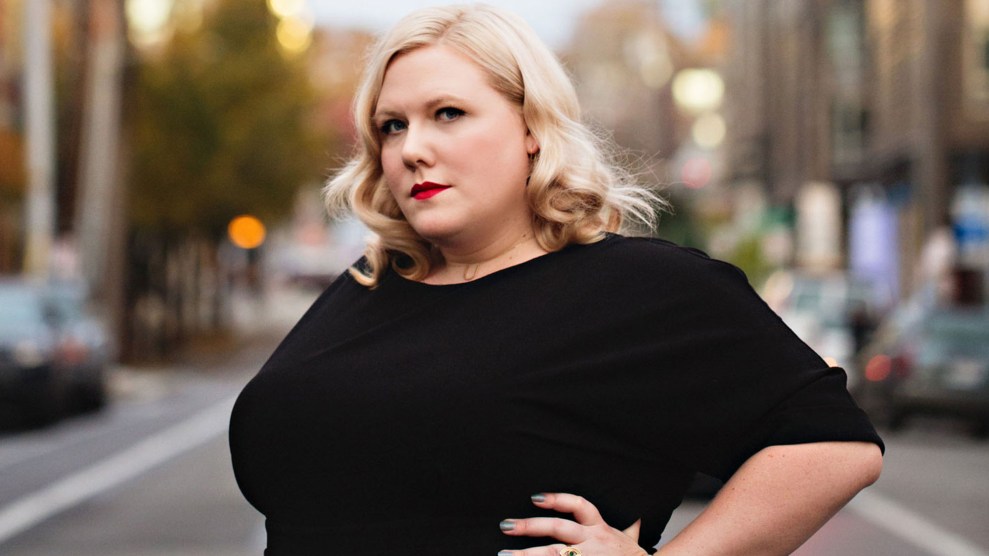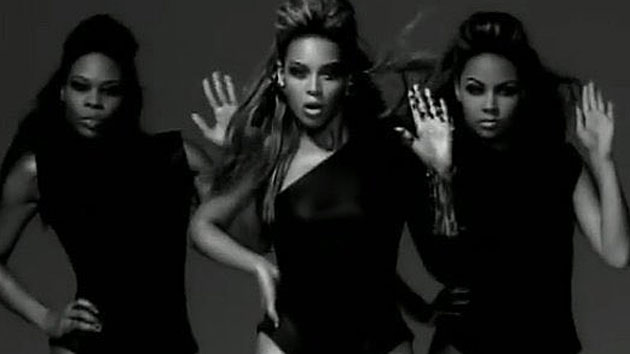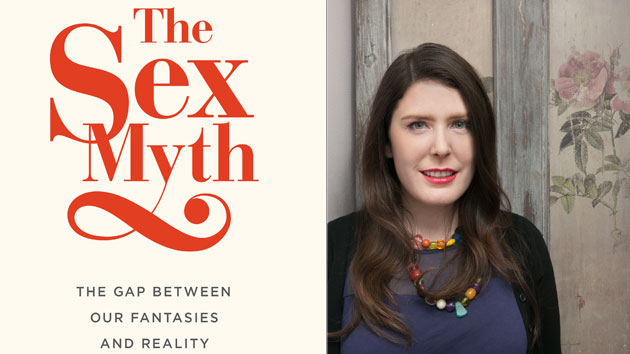
Photo by Jenny Jimenez.
Lindy West’s debut book, Shrill, is an emotional roller coaster. One moment you’re snorting from laughter, trying to avoid all the weird looks you’re getting on the train. The next you’re silently absorbing a larger truth neatly packaged into the perfect sentence you didn’t expect to read. Then, when you think you have reached a stretch of calm, you’re considering your own biases and humanity. Rest assured, you’re just about to laugh loud enough to startle even yourself.
West writes candidly about her first period, then ponders the larger consequences of having a period at all and how that bodily function relates to gender inequality. “Maybe if we didn’t perpetuate the idea that vaginas are disgusting garbage dumps…women would finally be considered fully-formed human beings, instead of off-brand men with defective genitals,” West writes. She describes her abortion as “mundane: a medical procedure that made my life better,” and reflects on the death of her father: “I never wanted anything as much as I wanted that shitty purgatory to be over. Except for one thing—for that shitty purgatory to never be over.” She writes about the relentless trolls who harassed her en masse after she took a stand against rape jokes, and the time she “came out” as fat during a very public confrontation with her boss, Dan Savage, over his fat-shaming blog posts at The Stranger, Seattle’s alt-weekly. She does all this with stark honesty, grace, and enough dark humor to balance the emotion. West sat down with Mother Jones to talk about how it all came to be.
Mother Jones: What made this the right time for your book?
Lindy West: It felt pretty organic. I’ve been doing short-form writing for a decade, and six years ago I signed with an agent, and we’ve been working on figuring out what my book would be. I was always so embarrassed that it took me so long to figure it out, but I think, in retrospect, I just wasn’t ready to write a book six years ago. I wasn’t confident enough as a writer and I wasn’t coherent enough in my worldview. It just took this long for me to be a mature enough writer and be ready to do it. Coincidentally, this is a year when feminism is really in the forefront of people’s minds with the election and with the general climate. I really feel like women’s voices are making themselves heard more than they ever have been in my life. It’s sad to say that, but like that we’re finally listening to rape victims—obviously not in a perfect way, but in a way where it’s not just a knee-jerk rejection from every side. There’s a conversation about the way the system underserves victims and protects powerful men. That’s been a huge conversation this year with Bill Cosby and [Jian] Gomeshi in Canada.
MJ: Not to mention the continuing debate around the right to an abortion.
LW: Yes! I mean, it’s still a really low bar [laughs]. It’s not like us being louder about abortion means that abortion rights are more solid. They’re being aggressively dismantled, actually. But the fact that we’re starting to reclaim the definition of what abortion is from a really scary, uniformly regretted, dangerous mistake to a normal, common, necessary medical procedure that makes a lot of people’s lives better. I think that will have a cumulative effect in the long run. It at least gets people thinking about abortion…We need to be protecting this legal right that’s being chipped away at in some really insidious ways.
MJ: Well, you’ve been a huge part of that with the Shout Your Abortion campaign and the chapter in the book that goes through your own abortion. It just seems so normal, like you’re getting knee surgery.
LW: It was really normal. The only reason it was stressful is because life is stressful. The procedure itself—I wasn’t conflicted about it. I’m really grateful to the abortion providers in my city who made that situation as smooth as possible in a stressful moment.
MJ: What did you read while you were writing Shrill?
LW: It was exclusively Tamora Pierce audiobooks, which are young adult fantasy novels. I find them very soothing, because I am a…weirdo. They’re just like so sincere and perfectly feminist in a way that’s not overbearing. I’ve always been an escapist, I guess, and I spend so much time on the internet absorbing ideas and processing the horrors of the world that when I’m actually going to read for pleasure, it’s always something ridiculous about a dragon. I’m so saturated with the injustice and torment of the real world that it’s really hard for me to get myself to read anything that’s even set in our universe, because I’m exhausted by our universe.
MJ: Caitlin Moran called your book “literally the new bible.” What’s your bible?
LW: I love all the people you would expect me to love. I love Jessica Valenti, I love Roxane Gay, both of whom have books coming out this year that I can’t wait to read. I would say that my writing idol currently—she’s gonna be so creeped out because I’ve name-checked her now in like five interviews—but I love Samantha Irby. She has a blog called Bitches Gotta Eat, and she has a book of essays called “Meaty” that came out a couple years ago and she’s working on a new book and she’s so perfectly candid and funny. She does this blend of personal essay and humor. Politics are worked in in a really artful way where you don’t feel like you’re reading a political polemic.
MJ: It had to be emotionally exhausting reflecting on your life this much and putting it on paper.
LW: Oh yeah. A lot of it is stuff that’s hard to look at that I didn’t want to revisit, but it felt important. There are things that I still avoided that could have made the book stronger, probably, but you can only dredge up so much pain…I think my next book is going to be light on the feelings, heavy on the jokes. Although I planned to make this book really funny and it got really dark, so we’ll see.
MJ: You blended the two. I mean, you worked in a Jon & Kate Plus Eight joke.
LW: I did! I was really sad, when we adapted it to the UK version, they were like, you can’t make a Jon Gosselin reference, and I was like, “Whyyyyy?” They were like, “No one in the UK is going to know what that is.” But it was such a good reference! Can’t they just look it up? I look up your weird celebrities when I read British books!
MJ: Have the people in your book read it yet?
LW: Ugh, I don’t know. Dan [Savage] hasn’t read it. If he does, I hope he feels okay about the way that he’s portrayed. I tried to be as fair and generous as possible. I’m not condemning him in any way, I’m actually grateful for the way that he writes about fat people now. These tough conversations are how we move forward and make progress. My mom’s read it; she asked me a couple questions like, “Did I not do a good job teaching you about periods?” I was like, “No, no, no, you totally did, I was just a complete neurotic weirdo.” People have been really kind and receptive. So hopefully no one will be mad at me.
MJ: In the book, you go through a big breakup with comedy. Do you think you’ll ever get back together?
LW: Yeah. My husband is a comedian, and although he’s been focused on other things for the past couple of years—he’s also a musician and writer—he hasn’t been doing stand-up. And the other day he was like, “Hey, FYI, I think I’m going to start doing stand-up again.” And I was like “Nooooooo, keep it out of my house!” I think I’ll get over that. On a practical level, I’m uncomfortable at comedy clubs because there are so many shitty dude comics who have made my life miserable. If I go to a comedy club and I look around, I don’t know which of the dudes lining the wall told me that I was too fat to get raped. It makes me nauseous. But that was a couple years ago, and meanwhile, comedy has changed a lot. I feel like women in comedy have staked out space for themselves and circled the wagons in this inspiring way to say that it’s absolutely unacceptable and ludicrous to suggest that women aren’t funny anymore in 2016. It just makes you look like a dinosaur.
MJ: So comedy isn’t a safe space for women, and any woman who’s ever been on the internet knows that’s not a safe space for women, either, and you’ve spent so much time in both realms. How do we go about evoking change?
LW: I’m a writer. I don’t know how to fix the internet. But I would love for men to pick up some of the slack on policing internet trolling. I would like to not have to spend so much of my time scolding men for their bad behavior. Largely, the people harassing me online are guys, and my male colleagues don’t experience the same kind of violent, sexualized, gendered harassment that my female colleagues experience. I want to say to men online, “Come get your people. Police your fellow dudes and talk to them about this shit, because I’m tired, and this has eaten up a lot of my time.” I’ve come to realize it’s a culture problem. The platform is just the vehicle for this ingrained systemic misogyny that we’re steeped in from birth to the point where men think of women as a scapegoat for their feelings. There’s something behind the decision to choose to lash out at a woman. The answer to how to fix internet trolling is like fixing sexism. How do you do that? I’m of the opinion that discourse helps, that changing people’s minds changes people’s actions. On a more practical level, I do enjoy sassing back at trolls, because I always win, because my job makes me better at arguing. If I can frustrate or embarrass a troll, then that lodges in that person’s brain that trolling me is not a consequence-free hobby.
MJ: In the middle of all the harassment, how do you take care of yourself?
LW: Well, a lot of fantasy audiobooks while being horizontal on my bed playing Candy Crush (Soda, not orig). I’m fortunate to have a hilarious, fun, brilliant family that I love spending time with that keeps me in a healthy head space. The internet can be so enthralling in a bad way, in a toxic way, where you feel like your brain is submerged in this sewer and you can’t climb out of it. The main thing is spending time with real physical people who remind you who you are. It can be so tempting to believe that you are who the internet says you are.
MJ: You talk a lot in the book about speaking truth to power. How do you find that power?
LW: It was like pushing through this barrier—it’s really scary at first to make yourself visible and say unpopular things because you think they’re right. It hurts, but eventually you realize you’re okay and you’re alive and you’ve developed some coping mechanisms. Now it feels like an obligation. I’m a deeply privileged person. I have a safe, comfortable life, and there’s very little at risk for me. I’m not going to get disowned by my family for talking about having an abortion, and I’m not risking my job or homelessness by saying something controversial that my employer might not like. I have this gift of stability and it feels obligatory to use that to make the world better in whatever small ways I can. It’s incredibly fulfilling. Even helping one person feel a little bit better is really important to me and makes me feel like my life means something.


















